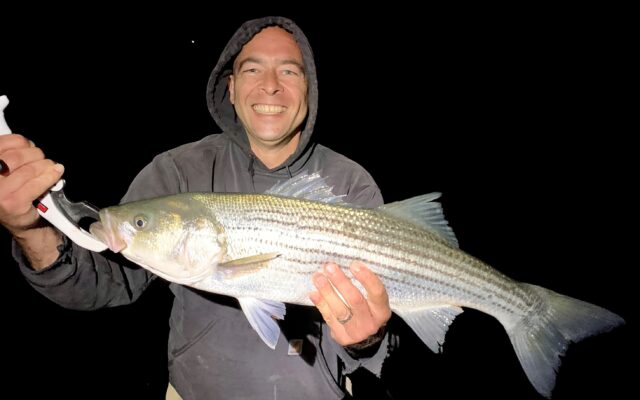
Whether to keep a fish, or release it, is a personal decision
By Chris Sargent
To keep or not to keep, that is the question. Whether guided by individual principle, influenced by pressure from others or in accordance with law, a decision needs to be made when fishing.
Far more consideration is required regarding the former and it often falls under heavy scrutiny by staunch supporters of the latter. It’s easy to find yourself at a crossroads in the moment, weighing the pros and the cons, the shoulds and should nots. But urgency dictates a quick choice — are you going to keep the fish or not?
I recall a conversation with one of my best friends and fishing partners during which he told me he’d caught a keeper-sized striper the previous night while fishing with another friend who is an accomplished and passionate striper fisherman. I asked if he kept the fish, to which he replied that he had not. I asked him why and so began a lively, philosophical dialogue about keeping fish versus not keeping fish.
His position of releasing all legal-sized stripers hinged largely on his friend’s logic that fish of that size are crucial for breeding purposes. For years, his friend had stood firmly against keeping any stripers other than on rare occasions, adhering strongly to a catch-and-release policy.
I prefaced my response with something to the effect of, “Yeah, man, that’s great and you do what you want, but … †I did my best to discuss with him the legitimacy of biological data, which supports taking a certain number of particular sized fish, ensuring a healthy population while allowing anglers to enjoy the resource at their table rather than only on the water.
I wasn’t in any way, shape or form trying to convince him to keep fish. I just genuinely felt it important to share the other side of things, providing him sound justification to allow himself license to enjoy a few amazing meals if he wished. A few days later, I received a picture of him holding a behemoth striper, just a quarter-inch short of the maximum slot limit length and well over 15 pounds. He took the fish home, raved about how good it tasted for days and the mount will live on his wall forever.
It should be a given that the primary variable in deciding to keep a fish or not is whether it is legal to do so. If not, the fish goes back into the water. But if it is legal to keep, then why shouldn’t you?
Specific legal parameters surrounding fish related to size, bag limit and season are set by the state, largely at the recommendation of Maine’s Department of Marine Resources or Department of Inland Fisheries and Wildlife biology staff, who work tirelessly to establish the best academic and practical data they can.
So, if the state says you can keep the fish, does that mean you should? It certainly means you can and are welcome to do so, but that’s where the ambiguity begins.
Like many anglers, I fish for a variety of reasons. I enjoy the fresh air, the challenge, the tug at the end of the line and, of course, I love to eat fish. Most of the time, I head out hoping to come back with at least one or a few legal specimens of whatever I’m targeting.
However, I routinely find myself unable to justify keeping a full limit unless the limit is only one fish. The situation is also species dependent, with considerable favor given to gamefish such as trout and salmon.
It often comes down to an internal battle between conservation and gluttony, which are concepts not always easily reconciled. It feels as though keeping a limit somehow cheats the resource, but in not doing so, in a way I’m cheating myself.
I remind myself that size and bag limits are set not only for the benefit of the fish but also for that of the angler. Stocking programs and fish studies are designed to provide opportunities for both fish and anglers and are meant to balance a put-and-take dynamic. Some waters are even purposefully stocked simply to provide fishing opportunities and keeping a full limit is encouraged.
There are those who subscribe to the catch-and-release-only model, believing that every fish should go back to be caught again another day. It’s hard to argue this particular mindset, and, subsequently, it continues to gain more and more traction, quickly becoming the cool, trendy thing to do.
However, such a devoted and steadfast position often lends itself to alienation by those who don’t follow suit. Unfortunately, we are seeing this surface as an issue at times within our fishing community, which would do far better to remain united.
So, to keep or not to keep? That is truly a question that can only be answered in the moment, given the circumstances and one’s own reasoning. Take it home to enjoy at the end of a fork if you like, or let it go to enjoy at the end of a line another day. After all, they call it fishing, not catching, and isn’t that where we find the real trophy?